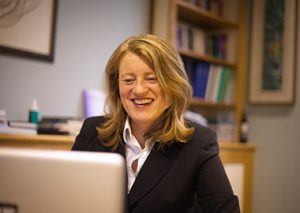Connected Life 2016: Collective Action and the Internet was a two day-long conference, held at the University of Oxford on 20th and 21st June 2016, dedicated to igniting multidisciplinary exchanges and showcasing exciting Internet research. Building on the two successful previous conferences, Connected Life 2016 fostered collaborations within and beyond Oxford in pursuit of an enhanced understanding of the Internet and its multifaceted effects upon society.
Speakers
 Mary Flanagan
Mary Flanagan
Mary Flanagan is a leading innovator, artist, educator and designer, whose works have included everything from game-inspired art, to commercial games that shift people’s thinking about biases and stereotypes. Her interest in play and culture led to her acclaimed book, Critical Play, with MIT Press (2009). Her fifth academic book, Values at Play in Digital Games, with philosopher Helen Nissenbaum, was released in 2014. Flanagan established the internationally recognized game research laboratory Tiltfactor (http://www.tiltfactor.org) in 2003 to invent “humanist” games and take on social through games. At Tiltfactor, designers create and research catchy games that teach or transform “under the radar” using psychological principles.

Helen Margetts
Helen Margetts is the Director of the OII, and Professor of Society and the Internet. She is a political scientist specialising in digital era governance and politics, investigating political behaviour, digital government and government-citizen interactions in the age of the internet, social media and big data. She has published over a hundred books, articles and major research reports in this area. Her most recent book is Political Turbulence: How Social Media Shape Collective Action (Princeton 2015).
Programme
A pdf version of the programme can be downloaded here.
Day 1 (Monday 20th June 2016)
| 09.00-10.00 |
Registration at the Ioannou Centre for Classical and Byzantine Studies |
| 10.00-11.00 |
Welcome address from Helen Margetts (Professor of Society and the Internet, Oxford Internet Institute) ROOM 1 |
| 11.00 – 12.30 |
Morning Sessions
SESSION 1: RESISTANCE (ROOM 1)
- Rodrigo Hernandez Gallegos (University of Warwick)– Are social media tools of democratization in Authoritarian Regimes? A critical assessment of the evidence from the Arab Spring.
- Philip Pond (RMIT, Melbourne) – Meaning and the digital maze: augmenting digital structural analysis with critical theory during the 2011 UK riots
- Georg Wolfart (University of Mannheim)– Civil Disobedience in the Digital Age – How Sina Weibo is empowering the Chinese citizens
SESSION 2: ACCESS & PARTICIPATION (ROOM 2)
- Ansgar Koene (University of Nottingham) and Ayten El Kashef (Gada) – Online habits, attitudes, and needs of civic engaged young people
- Aline Menezes (University of Essex) – Internet Availability, Political Information, and Voting: Evidence from Brazil
- Taskeen Adam (unaffiliated)– The potential for the propagation of MOOCs in SubSaharan Africa
- Andrew Bulovsky (University of Oxford)– Re-examining Putnam: Collective Action, Social Capital, and Citizenship in the 21st Century
SESSION 3: STRATEGIES (ROOM 3)
- Rikke Amundsen (University of Cambridge)– On Silencing as a Collective Speech Act
- Ilan Manor (University of Oxford) – Towards Networks of Diplomacy: Collective Diplomatic Action on Social Networking Sites
- Daniel Lundgaard (Copenhagen Business School) – Connective versus Collective Action in Social Movements
- Verity Trott (University of Melbourne) – Feminist Critique of Connective Action
|
| 12.30-14.00 |
Lunch and Visualization Fair |
| 14.00-15.30 |
Afternoon Sessions
SESSION 4: IRL AND URL (ROOM 1)
- Christoph Besel (University of Passau) – Inferring Semantic Interest Profiles from Twitter Followees: Does Twitter know better than your Friends?
- James Williams, Joshua Melville and Julianne Williams (University of Oxford)– Virtual Reality for Real Life: The Data Experience Lab Project
- Carl Ohman (University of Oxford)– The political economy of death in the age of information
- Benjamin Abrams (University of Cambridge)– Offline Movements’ Online Infrastructures: Contrasting Cairo and New York (2011)
SESSION 5: MAPPING THE TERRAIN (ROOM 2)
- Tamar Ashuri and Yaniv Bar-Ilan (University of Tel Aviv)– Collective action recruitment in a digital age: A typology of organizations and their filtering behavior
- Lex Gill and Dennis Redeker (University of Bremen)– Towards Digital Constitutionalism? Mapping Attempts to Craft an Internet Bill of Rights
- Josh Cowls and Federico Nanni (MIT) – The Potential and Perils of Election Prediction using Social Media Sources
- Meredydd Williams, Helena Webb, Marina Jirotka, William Housley, Peter Burnap, Rob Procter, Adam Edwards, Bernd Carsten Stahl, Matthew Williams and Omer Rana (University of Oxford) – An interactional analysis of Twitter collective action
SESSION 6: COMMUNITY & SOLIDARITY (ROOM 3)
- Marcin Waniek, Tomasz Michalak and Talal Rahwan (University of Warsaw)– Hiding Communities in Social Networks
- Jun Yu (LSE)– Connecting the social and the civic: a qualitative study of solidarity on Facebook
- David Martin, Mark Hartswood, Ognjen Scekic and Marina Jirotka (Xerox) – Socio-digital practices of collective action in online labour platforms
- Richard Heeks (University of Manchester)– Institutional Logics, Collective Action and the Patterns of Digital Development
|
| 15.30-16.30 |
Thunder talks
- Martin Dittus (UCL) – Building Large-Scale Crowdsourcing Communities with the Humanitarian OpenStreetMap Team
- Maria Bada and Jason Nurse (University of Oxford) – The Cybercrime Ecosystem: How the Internet Supports Criminal Behaviour Online
- James Williams (University of Oxford)- Why It’s OK to Block Ads
- Lauren McKarus (University of Oxford) – Hashtag Networks: Following the Insta-fit Lives of #KaylasArmy
- Wybo Wiersma (University of Oxford) – The Internet as a Catalyst for Social Movements: How Small Causes can Have Big Consequences
|
| 16.30-17.00 |
Coffee/tea |
| 17.00-18.00 |
Keynote address from Mary Flanagan (Sherman Fairchild Distinguished Professor in Digital Humanities, Dartmouth College) |
| 18.00-19.00 |
Drinks reception |
| 19.00-late |
Dinner and Social |
Day 2 (Tuesday 21th June 2016)
| 09.00-10.00 |
Registration at Balliol College |
| 10.00-11.30 |
Internet Revolutions: Information, Politics and Policy: Panel discussion with Kajal Odedra from Change.org UK, Alistair Alexander from Tactical Technology Collective, Andrew Puddephatt of Global Partners Digital and Christian Wulff Søndergaard of Telenor. |
| 11.30-12.30 |
Technology and Civic action: Presentations from activists and tech start-ups, including Paul Lenz and Gemma Humphrys from mySociety, Amy O’Donnell from Oxfam, Agne Milukaite from Cycle.Land in Oxford and Philippa Nuttall, Technology Transfer Manager at Oxford University Innovation. |
| 12.30-13.30 |
Lunch at Balliol College |
| 13.30-16.00 |
Workshops and Unconference session
During the afternoon we are hosting a range of workshops in the Oxford Internet Institute (1 St Giles). Sign up is on the day (Tuesday 21st June) at registration. If you have any queries please email us at connectedlife@oii.ox.ac.uk. In parallel to the organised workshops, a continuous informal unconference session will take place in the Balliol Lecture Theatre 23. |
| 13.30-14.30 |
Workshops Session One
Workshop 1.1 Crypto Party (OII Seminar Room)
CryptoParties are a global movement of events where people from beginners to experts can come together to talk about, learn about, and implement personal digital privacy tools online. Find out more here: https://www.cryptoparty.in/ During the workshop, our cryptography educators will give you the complete overview of major privacy tools – especially why they’re important – and we’ll get you set up with a few. The aim is to create a social, cooperative, fun environment where everyone can get hands-on experience installing and using privacy tools on their laptops, mobile phones and other devices. Requirements: Bring whatever devices – such as laptops and phones – that you would like to secure.
With opening remarks by Rick Falkvinge
Rick is an entrepreneur in IT and founder of the Swedish pirate party. After stepping down as party leader, Rick started working as political evangelist spreading ideas of information freedom and privacy. He is currently the head of privacy for Private Internet Access, a US-based personal VPN service
Workshop 1.2 Tactical Technology Collective (OII Meeting Room)
Tactical Tech is an International Organisation dedicated to the use of Information in Activism. See their website: https://tacticaltech.org Requirements: None. |
| 14.30-15.00 |
Tea and Coffee break |
| 15.00-16.00 |
Workshop Session 2
Workshop 2.1 Small Media (OII Seminar Room)
Dealing with Data: Scraping It & Shaping It
Small Media is a London-based action lab, providing digital research, training and advocacy solutions to support the work of civil society actors that provides assistance to at-risk communities globally. In this session, Small Media will talk about the fundamentals of scraping data from online sources, and will show how data-driven research can be made more impactful through the effective usage of data visualisations. The session will open with an overview of the research & design processes involved in developing Small Media’s interactive online report Writer’s Block, before moving onto a practical demonstration of some simple data scraping tools. Requirements: None, but laptops will be useful if you’d like to follow along with our demonstration.
Workshop 2.2 Introduction to LaTeX (OII Meeting Room)
LaTex is the de facto standard typesetting system for publishing in both the natural and social sciences. It is incredibly useful, enabling the easy creation and formatting of extremely long documents and the inclusion of complex details, such as mathematical formulae. LaTex is written in plain text rather than formatted text (as in a word processer like Microsoft Word). In this workshop, OII Research Fellow in Computational Social Science Taha Yasseri gives an introduction to using LaTeX. Requirements: all workshop attendees MUST bring their own computer. You will need a sharelatex account – this is free and can be easily created at www.sharelatex.com. You will also need Wi-Fi access on your computer. Login info for the free guest Wi-Fi is available at the registration desk. |
| 16.00 |
END OF CONFERENCE |
Organisers
Connected Life 2016 was run by MSc and DPhil students at the Oxford Internet Institute. All members of the 2016 Organising Committee are listed here.
Wybo Wiersma
Wybo Wiersma joined the OII first in 2010/2011 for his MSc. Then he went to work in Silicon Valley for Internet start-up Academia.edu. In 2012 he returned to pursue his DPhil with Sandra González-Bailón on critical mass in budding online political communities. His DPhil is funded by ESRC and Scatcherd scholarships. Before coming to the OII Wybo completed three bachelors degrees (in 7 years) at the University of Groningen (History, Information Science, and Philosophy of Information Science), and a Masters in Digital Humanities from King’s College London (all with distinctions). During these years he also worked as a statistics TA, and research-assistant for prof. J. Nerbonne, and set up the LogiLogi project, resulting in several conference presentations and publications. Wybo was the Programme Lead for the 2016 Connected Life conference.
Bertie Vidgen
Bertie Vidgen is a DPhil student at the OII. Before coming to the OII he completed a BA in History and Politics at the University of Warwick (2013) and an MA in Ideology and Discourse Analysis at the University of Essex (2014). In his research he examines the causes of xenophobic behaviour on social media, using network analysis and other computational methods. Outside his DPhil research, Bertie is interested in how large quantities of textual data can be used to understand political behaviour. Bertie was the Operations Lead for the 2016 Connected Life conference.
Ilinca Barsan
Ilinca Barsan was an MSc student at the OII from 2015 to 2016. She is now a Fellow at WPP. Ilinca was the Media Lead for the 2016 Connected Life conference.
Organizing Team
Copy-editor & Secretary: Kate Sim
Speaker Liaison Officer: Odysseas Sclavounis
Visual Design: Andrew Berkley
Marketing Manager: Eli Rachovitsky
Submissions Manager: Naomi Bick
Workshops and Panels Manager: Deniz Aydin
 Mary Flanagan
Mary Flanagan